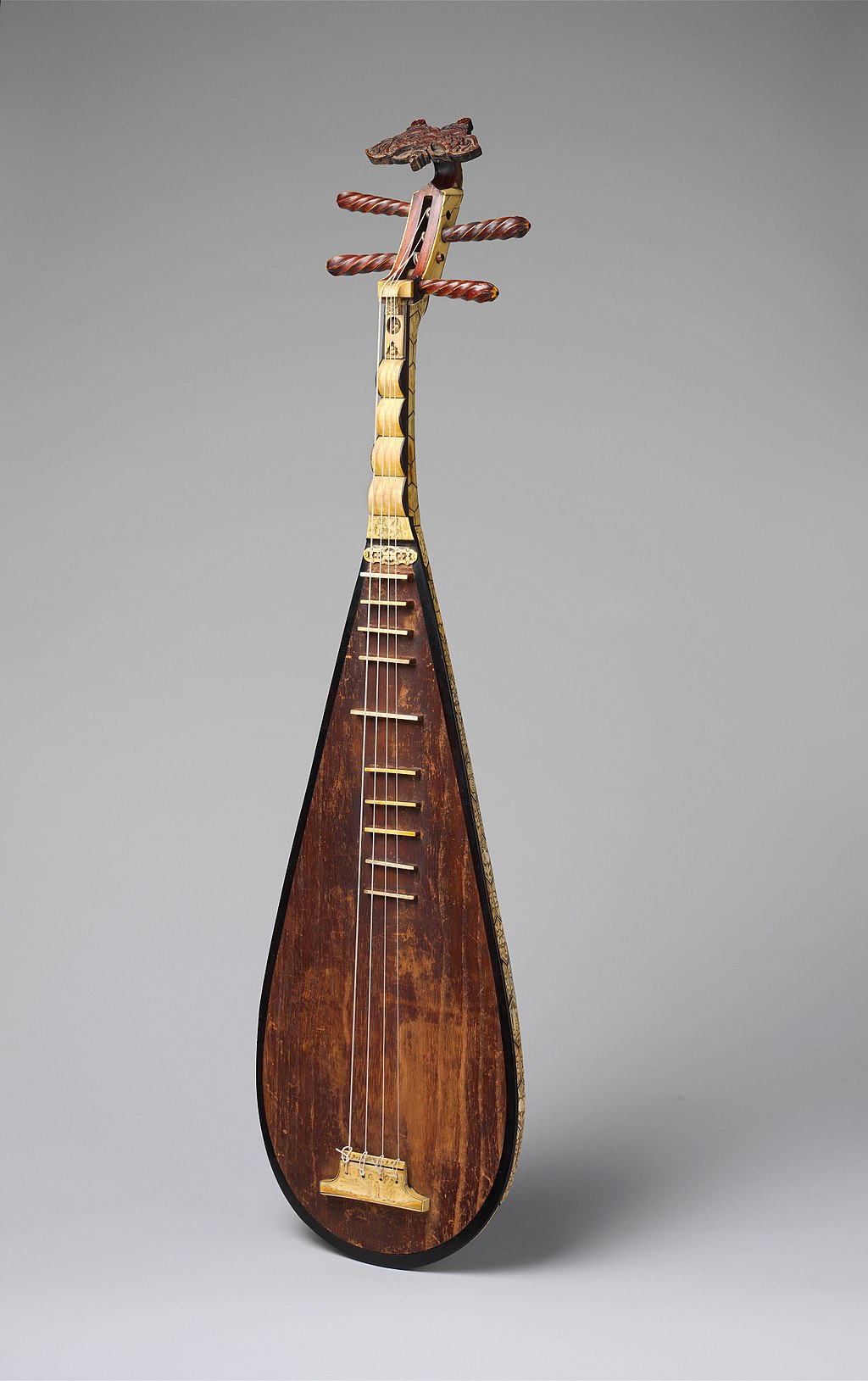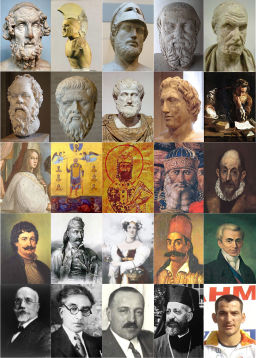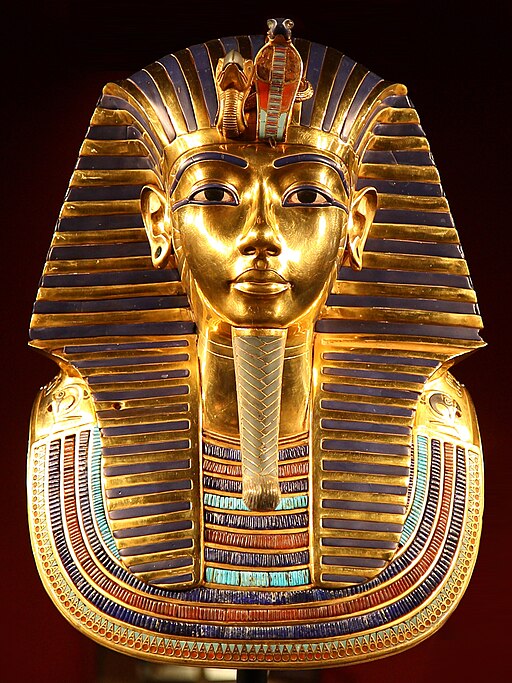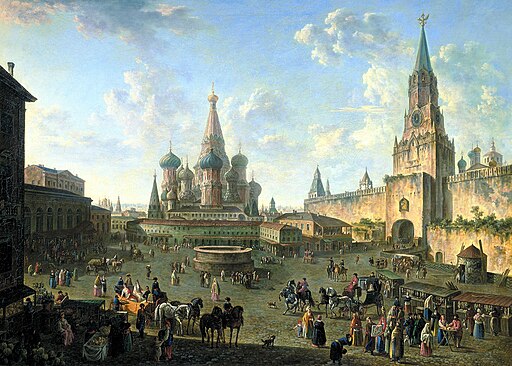
Ming-Dynasty Pipa
This Ming-Dynasty (1368 – 1644) Pipa is a four-stringed musical instrument, with a pear-shaped wooden body with a number of frets. The pear-shaped instrument may have existed in China as early as the Han dynasty (206 BCE-220 CE). The name “pipa” is made up of two Chinese syllables, “pí” (琵) and “pá” (琶). These refer to the way the instrument is played – “pí” is to strike outward with the right hand, and “pá” is to pluck in towards the palm.
The pipa is one of the most famous Chinese instruments and has been played for almost two thousand years in China. Several related musical instruments in Asia are derived from the Pipa. Until the mid-tenth century, the Pipa was held guitar style, and its twisted silk strings were plucked with a large triangular plectrum. Toward the end of the Tang dynasty (618–907), musicians began using their fingernails which gaining popularity and that became the new style. To help the fingers, the instrument began to be held in a more upright position.
The back and sides of this Pipa feature more than 100 hexagonal ivory plaques, each carved with figures and symbols signifying prosperity, happiness, and good luck. The front is relatively plain, but the ivory string holder bears a scene featuring four figures and a bridge. The lip has a bat motif with leafy tendrils. Also, there are a spider and a bird, two men with a fish on the frets and a trapezoidal plaque. The finial echoes the bat motif which signifies good luck.
Reflections
- The Pipa has been developed into a modern version and is in use today. Have you seen or heard a modern Pipa?
- Have you seen other versions of the Chinese Pia in different Asian cultures?
The Musical Instruments Collection at the Metropolitan Museum of Art – MET
- Ming-Dynasty Pipa
- Grand Piano
- Bass Fluegel Horn in B-flat
Ming-Dynasty Pipa
- Title: Ming-Dynasty Pipa
- Date: late 16th–early 17th century
- Culture: Chinese
- Geography: China
- Period: Ming dynasty (1368-1644)
- Materials: Wood, ivory, bone, silk
- Dimensions: L. 37 × W. 9 15/16 × D. 1 1/8 in. (94 × 25.3 × 2.9 cm)
- Museum: Metropolitan Museum of Art – MET
Explore the Metropolitan Museum of Art
MET European Paintings Collection
- “Pygmalion and Galatea” by Jean-Léon
- “Saint Jerome as Scholar” by El Greco
- “Portrait of Juan de Pareja” by Diego Velázquez
- “Camille Monet on a Garden Bench” by Claude Monet
- “View of Toledo” by El Greco
- “The Musicians” by Caravaggio
- “The Death of Socrates” by Jacques-Louis David
- “The Harvesters” by Pieter Bruegel the Elder
- “Young Woman Drawing” by Marie-Denise Villers
- “The Grand Canal, Venice” by J. M. W. Turner
- “The Houses of Parliament (Effect of Fog)” by Claude Monet
- “Madame Cézanne in a Red Dress” by Paul Cézanne
MET Modern and Contemporary Art Collection
- “Reclining Nude” by Amedeo Modigliani
- “Improvisation 27 (Garden of Love II)” by Wassily Kandinsky
- “Jeanne Hébuterne” by Amedeo Modigliani
- “The Card Players” by Paul Cézanne
- “Bathers” by Paul Cézanne
MET Greek and Roman Art Collection
- Statue of a Kouros
- Amathus Sarcophagus
- Mycenaean Terracotta Female Figures
MET Egyptian Art Collection
- The Temple of Dendur
- The Sphinx of Hatshepsut
- William the Faience Hippopotamus
MET Asian Art Collection
- Luohan – Yixian Glazed Ceramic Sculpture
- Pillow with Landscape Scenes – Zhang Family Workshop
- Jar with Dragon
MET Ancient Near Eastern Art Collection
- Sumerian Standing Male Worshiper
- Head of a Beardless Royal Attendant – Eunuch
- Human-Headed Winged Bull (Lamassu)
MET American Wing Collection
- “Washington Crossing the Delaware” by Emanuel Leutze
- “Portrait of Madame X” by John Singer Sargent
- “Mother and Child” by Mary Cassatt
- “Fur Traders Descending the Missouri” by George Caleb Bingham
- “The Gulf Stream” by Winslow Homer
MET Islamic Art Collection
- Blue Qur’an
- Marble Jar of Zayn al-Din Yahya Al-Ustadar
- The Damascus Room
MET Arts of Africa, Oceania and the Americas Collection
- Benin Ivory Mask
- African Face Mask – Kpeliye’e
- Sican Funerary Mask – Peru
- Ceremonial Axe – Papua New Guinea
MET European Sculpture and Decorative Arts Collection
- “Hercules the Archer” by Antoine Bourdelle
- “Orpheus and Eurydice” by Auguste Rodin
- “Perseus with the Head of Medusa” by Antonio Canova
MET Medieval Art Collection
- “The Last Supper” by Ugolino di Nerio
- Plaque with the Journey to Emmaus and Noli Me Tangere
- Doorway from the Church of San Nicolò, San Gemini
MET Drawings and Prints Collection
- Album of Tournaments and Parades in Nuremberg
- “Canvassing for Votes” by William Hogarth
- “Christ and the Woman of Samaria” by Rembrandt
MET Costume Institute Collection
- Bodice
- Cardinal Cape
- Doublet
MET Arms and Armor Collection
- Blade and Mounting for a Sword (Katana)
- Double-Barreled Flintlock Shotgun
MET Photograph Collection
- Loie Fuller Dancing
- Sala Delle Statue, Vatican
- Gardner’s Photographic Sketchbook of the War
MET Musical Instrument Collection
- Ming-Dynasty Pipa
- Grand Piano
- Bass Fluegel Horn in B-flat
Explore the MET
-
- The MET Cloisters
- Met Breuer
- Metropolitan Museum of Art – MET
~~~
“A single tree makes no forest;
one string makes no music.”
– Chinese Proverb
~~~
Photo Credit: 1) Metropolitan Museum of Art [CC0], via Wikimedia Commons
Popular this Week








 Sponsor your Favorite Page
Sponsor your Favorite Page SEARCH Search for: Search Follow UsJoin – The JOM Membership Program
Sponsor a Masterpiece with YOUR NAME CHOICE for $5
Share this:
- Tweet
